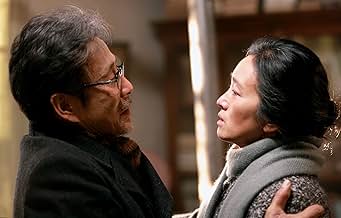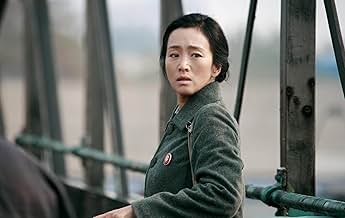IMDb RATING
7.2/10
7K
YOUR RATING
Lu and Feng are a devoted couple forced to separate when Lu is arrested and sent to a labor camp as a political prisoner during the Cultural Revolution. He finally returns home only to find ... Read allLu and Feng are a devoted couple forced to separate when Lu is arrested and sent to a labor camp as a political prisoner during the Cultural Revolution. He finally returns home only to find that his beloved wife no longer recognizes him.Lu and Feng are a devoted couple forced to separate when Lu is arrested and sent to a labor camp as a political prisoner during the Cultural Revolution. He finally returns home only to find that his beloved wife no longer recognizes him.
- Awards
- 23 wins & 49 nominations total
- Director
- Writers
- All cast & crew
- Production, box office & more at IMDbPro
Featured reviews
Coming Home is a great example of the way in which a movie can move you, play on your emotions, without being sentimental in a negative sense. Without being a tear-jerker. And without harsh images of struggle and war. But with excellent acting, small gestures and not so much words. This movie is all about empathy, first among the characters in the story depicted, but by consequence also among the audience, that is swept away and taken in by the sentiment.
This doesn't mean that the story is only about love and compassion. The Cultural Revolution in China (1966-1976) was far from being peaceful and compassionate. People were separated for years without any information, were forced to report any 'wrong' behavior that could 'harm' or 'threaten' the Communist Party. Coming Home shows how such an environment affects people at the individual, family level. People get damaged and family relations are shattered because of betrayal.
Coming Home succeeds in portraying the consequences of such a regime, by showing what humanity and compassion mean. And that is what makes it special, and refreshing in a world where it sometimes feels like these values are hard to find.
This doesn't mean that the story is only about love and compassion. The Cultural Revolution in China (1966-1976) was far from being peaceful and compassionate. People were separated for years without any information, were forced to report any 'wrong' behavior that could 'harm' or 'threaten' the Communist Party. Coming Home shows how such an environment affects people at the individual, family level. People get damaged and family relations are shattered because of betrayal.
Coming Home succeeds in portraying the consequences of such a regime, by showing what humanity and compassion mean. And that is what makes it special, and refreshing in a world where it sometimes feels like these values are hard to find.
Spielberg "cried for an hour" did not lie. I felt like I had been stabbed and watched, and I felt like I was dehydrated when I left the cinema. The Chinese love, which is not fast-paced, is surrounded by the times and shows two sides.
Sometimes a movie comes along that requires your patience, but is worth every minute of your time. "Coming Home" (PG-13, 1:49) is one of those movies. It's a Chinese film, which, for most of us, means subtitles, but this film is from Yimou Zhang, the director of "Hero" and "House of the Flying Daggers", and stars Gong Li (also known as Li Gong), who starred in "House of the Flying Daggers" and "Memoirs of a Geisha", as well as "Hannibal Rising" and "Miami Vice". This film's pace is slow, but an open-minded audience member's reward will be a dramatic and heart-breaking romance that you won't soon forget.
The setting is China, during Communist Party Chairman Mao Zedong's "Cultural Revolution". Starting in 1966, and only really ending with Mao's death in 1976, this was a nationwide effort to purge remnants of capitalism and even Chinese culture which ran contrary to Chairman Mao's personal interpretation of communism. Party officials and local police publicly humiliated and harassed people, seized property, relocated many Chinese citizens, tortured some and arbitrarily imprisoned others. One of those was a college professor named Lu Yanshi (Daoming Chen), whose time in Chinese labor camps kept him away from his wife, Feng Wanyu (Gong Li) and young daughter Dandan (Huiwen Zhang) for a total of 20 years.
As the film opens, Feng and her teenage daughter are summoned to the office of a party official who informs them that Lu has escaped from prison. The official sternly reminds them that failure to report any contact with Lu is a crime. The thoroughly indoctrinated Dandan responds obediently by spouting a line of communist propaganda. Feng merely responds that she understands. Lu does try to rejoin his family, resulting in some of the most tense and best-acted scenes I've ever watched on the big screen.
It is only after the Cultural Revolution ends that Lu can return home safely. By that time, Feng is suffering from a type of amnesia that requires her to refer to notes so she can accomplish ordinary daily tasks and, tragically, also renders her unable to recognize her husband. She remembers Feng as a young man, but when she finally sees him face to face, she mistakes him for a party official whom she hates and she kicks him out of the house. No one, can convince her that the man she has turned away really is Lu – not the local communist party officials and not even Feng's own daughter who has grown up to regret the ways she had denied or been disloyal to her father. Neither the audience, nor Lu himself knows whether, the next time Feng sees him, she'll mistake him for an old enemy, think that he is a piano tuner or a friendly neighbor, or even acknowledge him at all.
Lu takes up residence in an abandoned store across the street and his daughter, now living on her own, establishes a relationship with Lu and works with him to try overcoming her mother's amnesia. Feng receives a long-delayed letter from Lu telling her that he's coming home "on the 5th of the month". She readies the house in anticipation, even as she sees Lu around the neighborhood on a regular basis, but never recognizes him. Lu and Dandan talk to Feng's doctor and try various strategies, direct and indirect, hoping to get Feng to remember her heart-broken husband. Meanwhile, on the 5th of every month, Feng journeys to the train station and holds a hand-made sign with her husband's name on it until the last of the passengers have descended the long, stone staircase and the workers close the large, metal gates.
"Coming Home" is a combination of the 1965 classic romance "Doctor Zhivago" and the more modern romance in 2004's "The Notebook", but with a distinct Chinese sensibility. The setting, however, is merely background. This film has the potential to deeply affect people regardless of age or nationality. The acting is truly outstanding, especially from Gong Li who lives completely in every moment of this film, acts with every cell of her body and gives a performance for the ages. This film is so well written, directed, acted and edited that it requires no understanding of the Chinese language and no knowledge of Chinese history or culture to enjoy and appreciate this timeless tale of love, loss and redemption. It may sound trite, but the language of love truly is universal. That, and the other emotions and relationships that are part of this story require nothing more than a human heart to understand. I'd rather that this film had incorporated a little more variation in tone and pacing, but there is no denying this film's power to use the emotions of its characters to touch the emotions of its audience. "A-"
The setting is China, during Communist Party Chairman Mao Zedong's "Cultural Revolution". Starting in 1966, and only really ending with Mao's death in 1976, this was a nationwide effort to purge remnants of capitalism and even Chinese culture which ran contrary to Chairman Mao's personal interpretation of communism. Party officials and local police publicly humiliated and harassed people, seized property, relocated many Chinese citizens, tortured some and arbitrarily imprisoned others. One of those was a college professor named Lu Yanshi (Daoming Chen), whose time in Chinese labor camps kept him away from his wife, Feng Wanyu (Gong Li) and young daughter Dandan (Huiwen Zhang) for a total of 20 years.
As the film opens, Feng and her teenage daughter are summoned to the office of a party official who informs them that Lu has escaped from prison. The official sternly reminds them that failure to report any contact with Lu is a crime. The thoroughly indoctrinated Dandan responds obediently by spouting a line of communist propaganda. Feng merely responds that she understands. Lu does try to rejoin his family, resulting in some of the most tense and best-acted scenes I've ever watched on the big screen.
It is only after the Cultural Revolution ends that Lu can return home safely. By that time, Feng is suffering from a type of amnesia that requires her to refer to notes so she can accomplish ordinary daily tasks and, tragically, also renders her unable to recognize her husband. She remembers Feng as a young man, but when she finally sees him face to face, she mistakes him for a party official whom she hates and she kicks him out of the house. No one, can convince her that the man she has turned away really is Lu – not the local communist party officials and not even Feng's own daughter who has grown up to regret the ways she had denied or been disloyal to her father. Neither the audience, nor Lu himself knows whether, the next time Feng sees him, she'll mistake him for an old enemy, think that he is a piano tuner or a friendly neighbor, or even acknowledge him at all.
Lu takes up residence in an abandoned store across the street and his daughter, now living on her own, establishes a relationship with Lu and works with him to try overcoming her mother's amnesia. Feng receives a long-delayed letter from Lu telling her that he's coming home "on the 5th of the month". She readies the house in anticipation, even as she sees Lu around the neighborhood on a regular basis, but never recognizes him. Lu and Dandan talk to Feng's doctor and try various strategies, direct and indirect, hoping to get Feng to remember her heart-broken husband. Meanwhile, on the 5th of every month, Feng journeys to the train station and holds a hand-made sign with her husband's name on it until the last of the passengers have descended the long, stone staircase and the workers close the large, metal gates.
"Coming Home" is a combination of the 1965 classic romance "Doctor Zhivago" and the more modern romance in 2004's "The Notebook", but with a distinct Chinese sensibility. The setting, however, is merely background. This film has the potential to deeply affect people regardless of age or nationality. The acting is truly outstanding, especially from Gong Li who lives completely in every moment of this film, acts with every cell of her body and gives a performance for the ages. This film is so well written, directed, acted and edited that it requires no understanding of the Chinese language and no knowledge of Chinese history or culture to enjoy and appreciate this timeless tale of love, loss and redemption. It may sound trite, but the language of love truly is universal. That, and the other emotions and relationships that are part of this story require nothing more than a human heart to understand. I'd rather that this film had incorporated a little more variation in tone and pacing, but there is no denying this film's power to use the emotions of its characters to touch the emotions of its audience. "A-"
I'm was born in early 90s in China. As I grow up, my parents always consciously saving up everything. They do not waste anything, food, clothes, etc..
My mom is good at stitching clothes. Even thou she can afford buying a new pair of socks, she chose to stitch up the worn ones. I thought I'd never understand why my parents are so thrifty, until I watched this movie.
I came to realize what a hard, tough and poor life my parents had went thru after watching this movie. I was even surprised that my parents could actually survived that period of time.
I realized that people don't need that much of things to survive. When my friend and I shopping in mall, talking about cosmetics and luxury bags, and living a wealthy and "fancy" life, while my mother when she was in my age, struggling to live, wearing the same clothes everyday, celebrating her birthday by only eating an egg, running after trains in order to pick up the "coal ball" (trains in old time use coal as the fuel and the coal ball is the coal which was not fully burned, and could still being used for generating a little heat).
This is a great movie to honor that harsh period of time in China's history. And I'm also glad to see that Chinese government now allows people to talk about that period of time and even make a movie about it.
My mom is good at stitching clothes. Even thou she can afford buying a new pair of socks, she chose to stitch up the worn ones. I thought I'd never understand why my parents are so thrifty, until I watched this movie.
I came to realize what a hard, tough and poor life my parents had went thru after watching this movie. I was even surprised that my parents could actually survived that period of time.
I realized that people don't need that much of things to survive. When my friend and I shopping in mall, talking about cosmetics and luxury bags, and living a wealthy and "fancy" life, while my mother when she was in my age, struggling to live, wearing the same clothes everyday, celebrating her birthday by only eating an egg, running after trains in order to pick up the "coal ball" (trains in old time use coal as the fuel and the coal ball is the coal which was not fully burned, and could still being used for generating a little heat).
This is a great movie to honor that harsh period of time in China's history. And I'm also glad to see that Chinese government now allows people to talk about that period of time and even make a movie about it.
"Coming Home" (2014 release from China; 110 min.) brings the story of Lu, a "rightist bastard" during the Cultural Revolution. As the movie opens, we see a woman (Feng) and her daughter (Dandan) being called into the Propaganda Office of the girl's school, where they learn that Lu (the husband and father, respectively) has escaped from labor camp, and that they are not to see him. Feng and Lu nevertheless decide to meet up at the train station, where Lu gets captured again. We are then told "Three years later, the Cultural Revolution ends", and Lu arrives back home. Much to his shock, Feng does not recognize him. What caused Feng's amnesia? Will she ultimately recognize him? To tell you more would spoil your viewing experience, you'll just have to see for yourself how it all plays out.
Couple of comments: this is the latest movie from director Zhang Yimou (best known here for "House of the Flying Daggers"), Here he tackles a potentially sensitive topic in China, namely the horrible Cultural Revolution. But don't think that this is a political movie. Instead, it is a love story that happens to be set during and after the Cultural Revolution. Feng is played by the leading Chinese actress Gong Li (think of her as the Meryl Streep of China), and plays the role with restraint and visible hurt. Special mention also for the beautiful Zhang Huiwen in the role of Dandan (check out the ballet performances!). Last but not least, I couldn't help but notice that the piano you hear in the orchestral score is played by none other than Lang Lang. Bottom line: "Coming Home" is a slow-moving (in the best possible way) movie that examines the long shadows of the Cultural Revolution through the eyes of one particular couple.
This movie is now a year and a half, yet it recently showed up out of the blue at my local art-house theater here in Cincinnati. Better late than never I suppose. The weekday evening screening where I saw this at was attended poorly. A shame. If you are in the mood for a top-notch quality foreign movie that is light years away from your standard Hollywood fare, you may want to give this a try. "Coming Home" is HIGHLY RECOMMENDED!
Couple of comments: this is the latest movie from director Zhang Yimou (best known here for "House of the Flying Daggers"), Here he tackles a potentially sensitive topic in China, namely the horrible Cultural Revolution. But don't think that this is a political movie. Instead, it is a love story that happens to be set during and after the Cultural Revolution. Feng is played by the leading Chinese actress Gong Li (think of her as the Meryl Streep of China), and plays the role with restraint and visible hurt. Special mention also for the beautiful Zhang Huiwen in the role of Dandan (check out the ballet performances!). Last but not least, I couldn't help but notice that the piano you hear in the orchestral score is played by none other than Lang Lang. Bottom line: "Coming Home" is a slow-moving (in the best possible way) movie that examines the long shadows of the Cultural Revolution through the eyes of one particular couple.
This movie is now a year and a half, yet it recently showed up out of the blue at my local art-house theater here in Cincinnati. Better late than never I suppose. The weekday evening screening where I saw this at was attended poorly. A shame. If you are in the mood for a top-notch quality foreign movie that is light years away from your standard Hollywood fare, you may want to give this a try. "Coming Home" is HIGHLY RECOMMENDED!
Did you know
- TriviaComing Home (2014) had its international premiere at the 2014 Cannes Film Festival in the out of competition section. It was scheduled to be screened in the Special Presentations section of the 2014 Toronto International Film Festival.
- ConnectionsFeatured in Sven Uslings Bio: Bästa filmer 2020 Del 1: Plats 20-11 (2021)
- SoundtracksSong of the Fishermen
Written by Ren Guang
Arranged by Quigang Chen
- How long is Coming Home?Powered by Alexa
Details
- Release date
- Country of origin
- Official site
- Language
- Also known as
- The Criminal Lu Yanshi
- Filming locations
- Production companies
- See more company credits at IMDbPro
Box office
- Gross US & Canada
- $377,607
- Opening weekend US & Canada
- $26,361
- Sep 13, 2015
- Gross worldwide
- $47,587,984
- Runtime1 hour 49 minutes
- Color
- Sound mix
- Aspect ratio
- 2.35 : 1
Contribute to this page
Suggest an edit or add missing content
























